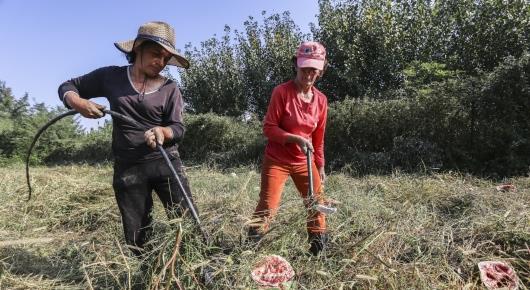Women’s access to land is focus of international conference this week

Women's land rights are vital to every country’s development. Yet, those rights are routinely violated, denied, or simply not enforced. “Empowering women through access to land” is the focus of an international conference taking place here today, organized by FAO together with GIZ on behalf of the Government of Germany.
In many countries in the Western Balkans, women have lower access to land than their male peers, and are often restricted to so-called “secondary land rights.” This means they have land rights only via male family members. In the case of divorce, widowhood or her husband’s migration, a woman risks losing her entitlements.
Without clear ownership rights, women may be unable to sell or lease land, or use land as collateral for obtaining credit.
“The obstacles that prevent rural women from effectively enjoying land rights are numerous and complex,” said Marcela Villarreal, Director of FAO’s Office of Partnerships, Advocacy and Capacity Development Division. “They range from inadequate legal standards and weak enforcement, to cultural barriers.”
The percent of females registered as owners or co-owners of land across the Western Balkans ranges from 15 to 39 percent, and in some regions is as low as 3 percent. Due to earlier efforts by FAO and The World Bank, institutions in these countries are now more aware of the problem and committed to making improvements.
Deutsche Gesellschaft für Internationale Zusammenarbeit (GIZ) GmbH on behalf of the German Federal Ministry for Economic Cooperation and Development and FAO have been coordinating their efforts in the Western Balkans to promote progress on Sustainable Development Goal No. 5, on gender equality. Specifically, FAO and the Open Regional Fund for South East Europe – Legal Reform are cooperating to facilitate the monitoring of Target 5a: “Undertake reforms to give women equal rights to economic resources, as well as access to ownership and control over land and other forms of property, financial services, inheritance and natural resources, in accordance with national laws.”
Utilizing the FAO Legal Assessment Tool and Country Profiles, and with the support of GIZ, the legal frameworks of Western Balkan countries have been reviewed. Gaps in legislation have been identified and recommendations made.
“It has become clear,” Villarreal said, “that customs and traditions often prevail over the legal norms. Therefore, the role of notaries and land registration offices is seen as crucial for improving gender equality in access to land.”
Today’s conference will be attended by representatives of ministries, registration offices, notaries, equality bodies, statistical offices, NGOs from the region and international organizations from South East Europe .
It will take the form of a technical round table during which participating teams will identify and make commitments concerning the steps necessary to improve gender equality on land rights.
Three panels will take up different aspects of the issue. The first will be a political discussion of gender and land rights, presented by the German Embassy, FAO, the Office of the Albanian Prime Minister, and the Albanian Ministry of Justice. In the second panel, delegates will share different aspects of the importance of registering property, best practices and initiatives that have been effective. In the third and final panel, development partner organizations and legal practitioners will present their perspectives, key findings for the region, and information about a new GIZ project involving the International Union of Notaries and FAO.
10 March 2017, Tirana, Albania
